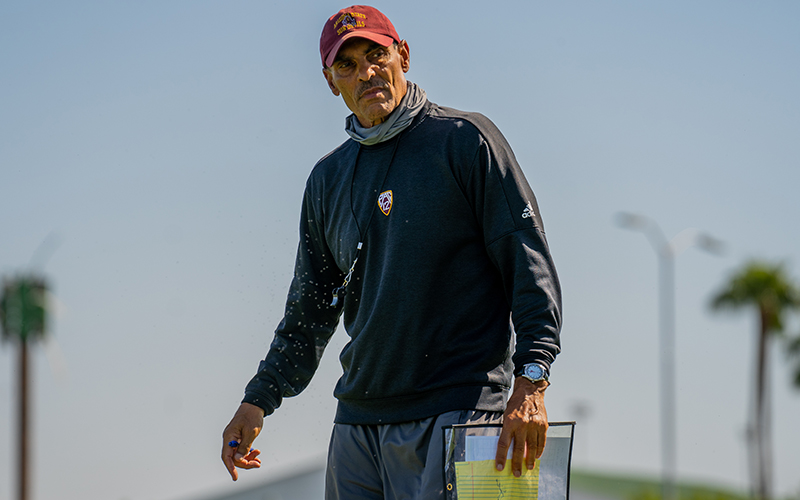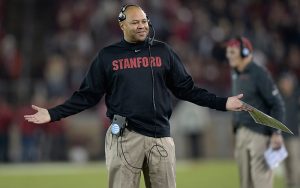
Arizona State’s Herm Edwards is one of five Black head football coaches in the Pac-12. He said he longs for the day when he doesn’t have to talk about it. (Photo by Julian Rosa/Cronkite News)
TEMPE – When Herm Edwards and Arizona State face Colorado Saturday, it will be the second of five games in which the Sun Devils will face a Black head coach.
No other Power Five Black head football coach will find himself in a similar situation this year, illustrating again how the Pac-12 Conference continues to be at the forefront of minority hiring.
The Pac-12 is the only conference within the Power Five with more than 10 Black head coaching hires. Just over half of Power Five programs have never hired a Black head coach, according to an ESPN report, and there are currently two Power Five conferences with zero Black head coaches: the Southeastern Conference and the Big 12.
It’s been a long road for a lot of coaches that never got opportunities,” Edwards said. “I think that any time that you got an opportunity that you got to realize, you’re standing on somebody else’s shoulders.”
Earlier this month, USC announced the promotion of defensive backs coach Donte Williams to interim head coach, making him the first Black head coach in the program’s history.
It increased the number of African American coaches in the conference to five: Williams, Edwards, Standford’s David Shaw, Washington’s Jimmy Lake and Colorado’s Karl Dorrell.
“It’s always uplifting … anytime you see somebody get an opportunity like that, it gives you energy,” Edwards said. “I would hope one day, I’ll probably be long gone, I’ll probably be with my grandkids watching football games, that we don’t have to talk about it.”
DaWon Baker has only been in his position as Colorado’s Associate Athletic Director and Director over Diversity, Equity, and Inclusion for four months, but said he already has witnessed the dedication and focus Athletic Director Rick George has put into DEI efforts.

Stanford coach David Shaw is one of five Black Pac-12 football coaches. (Photo by Thearon W. Henderson/Getty Images)
“Rick is the type of guy that when he decides he’s going to do something, he’s all in on it,” Baker said. “That’s something that I’ve seen from him, and something that I’ve seen him do with regards to diversity, equity, and inclusion.”
Baker said in a meeting with George Kliavkoff, he received a similar vibe from the new Pac-12 commissioner. Baker said that Kliavkoff sent this message:
“The Pac-12 is the conference of champions, but the Pac-12 has been a leader in mental health, it’s been a leader in student safety, has been a leader in diversity, equity and inclusion. And my plan is to continue to make sure that we’re leaders on all of those fronts, and that we’re leaders, you know, for the rest of the country, in regards of how we revolutionize college sports.”
Ray Anderson, Vice President for University Athletics at Arizona State, said what we are seeing from teams in the Pac-12 is nothing new.
“The Pac-12 in terms of the diversified coaching staff or head coaches, particularly in football, goes back some ways,” Anderson said. “The Pac-12 certainly in football has been a leader for a long time, and I think that’s because you have a very frankly different culture and environment out here that’s more diversified, more progressive than other parts of the country.”
When ASU hired Charles Harris in 1985, he was the first Black athletic director at a Power Five school.
Four football programs out of the 65 teams in the Power Five have hired Black head coaches back-to-back. Two of those teams are from the Pac-12: Stanford and Colorado, according to ESPN.
“People tend to hire folks who are in their comfort zone. who look like them, who may grow up like them,” Anderson said. “A lot of this falls on presidents and chancellors and athletic directors who are responsible for hiring head coaches. They bear the responsibility for why there aren’t more people of color in head coaching positions, particularly in football at the college level.”
Just two Black chancellors or presidents lead FBS autonomy schools, according to the NCAA Demographics Database in 2020, and just six programs have Black athletic directors.
Efforts have increased in recent years to get more people of color in coaching and senior administrative positions.
In 2016, presidents and chancellors of these universities were presented with the opportunity to sign the “Presidents Pledge.” It declared their universities would be committed to promoting diversity and gender equity in intercollegiate sports. According to the NCAA, 82.8% of representatives at Division I universities have signed this pledge.
In 2009, Oregon passed House Bill 3118, a law that mandates that each university must interview at least one qualified minority candidate for open coaching or athletic director positions unless the institution was unable to identify qualified minority candidates willing to interview for positions.
“You know, diversity in opportunities should be put together consistently and deliberately, and they’ve done that in the Pac-12 and they haven’t done that in other conferences,” Anderson said.
“That’s what it comes down to.”

